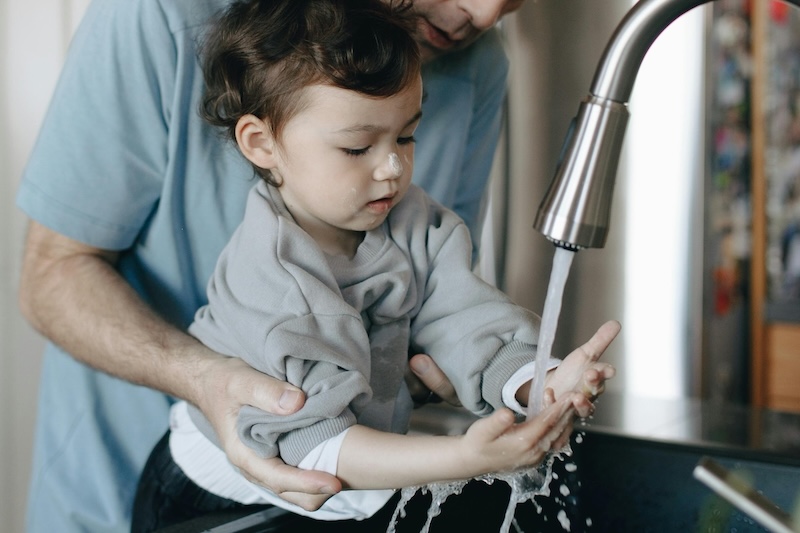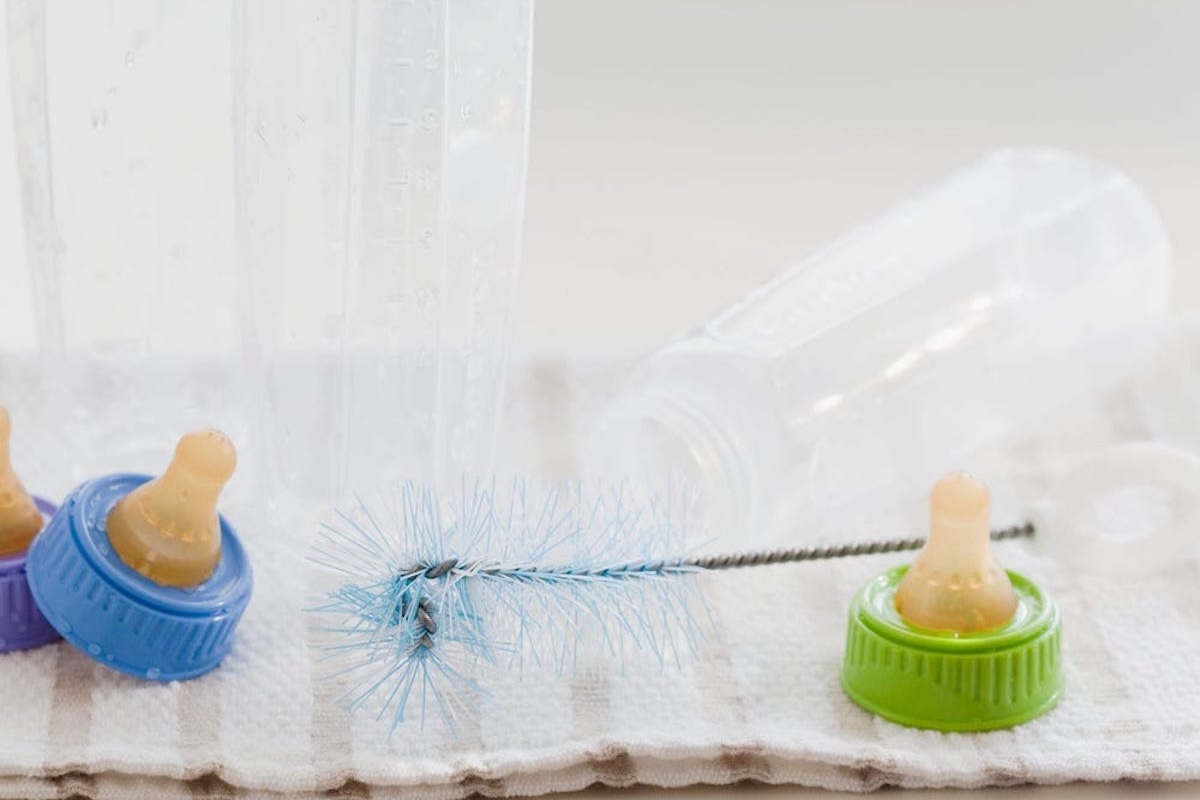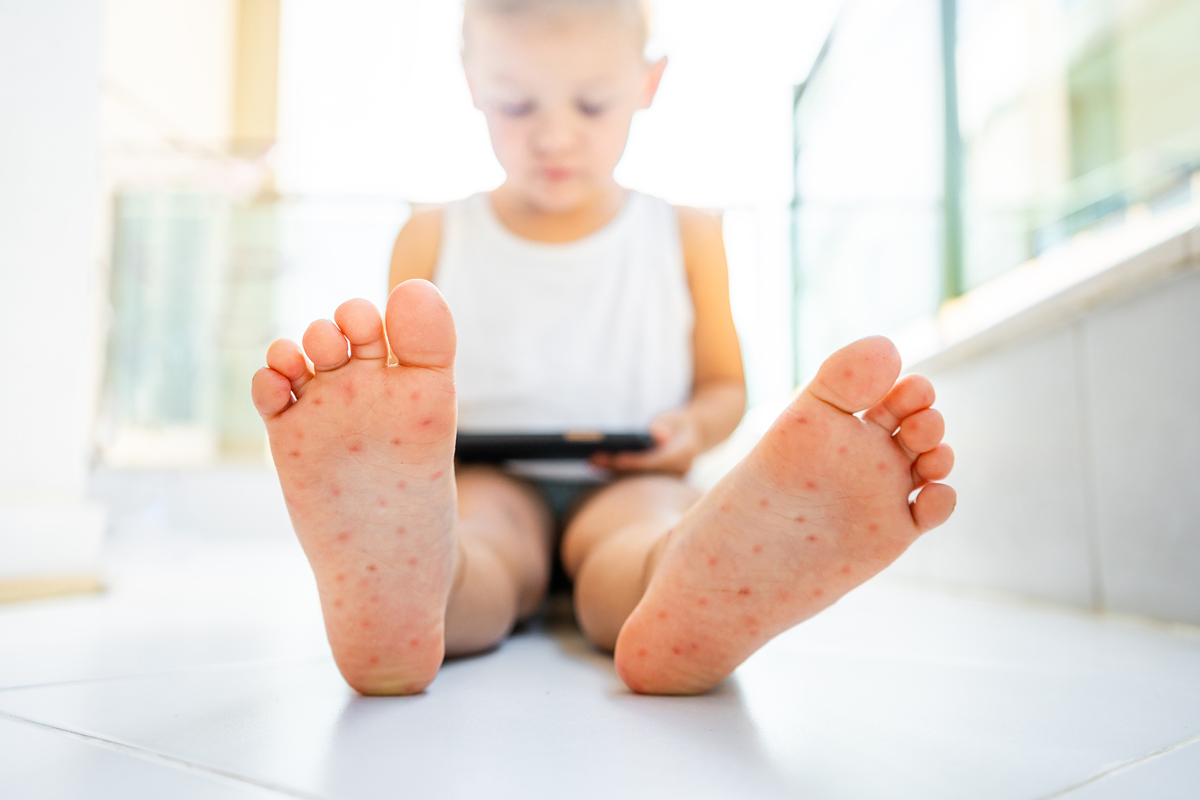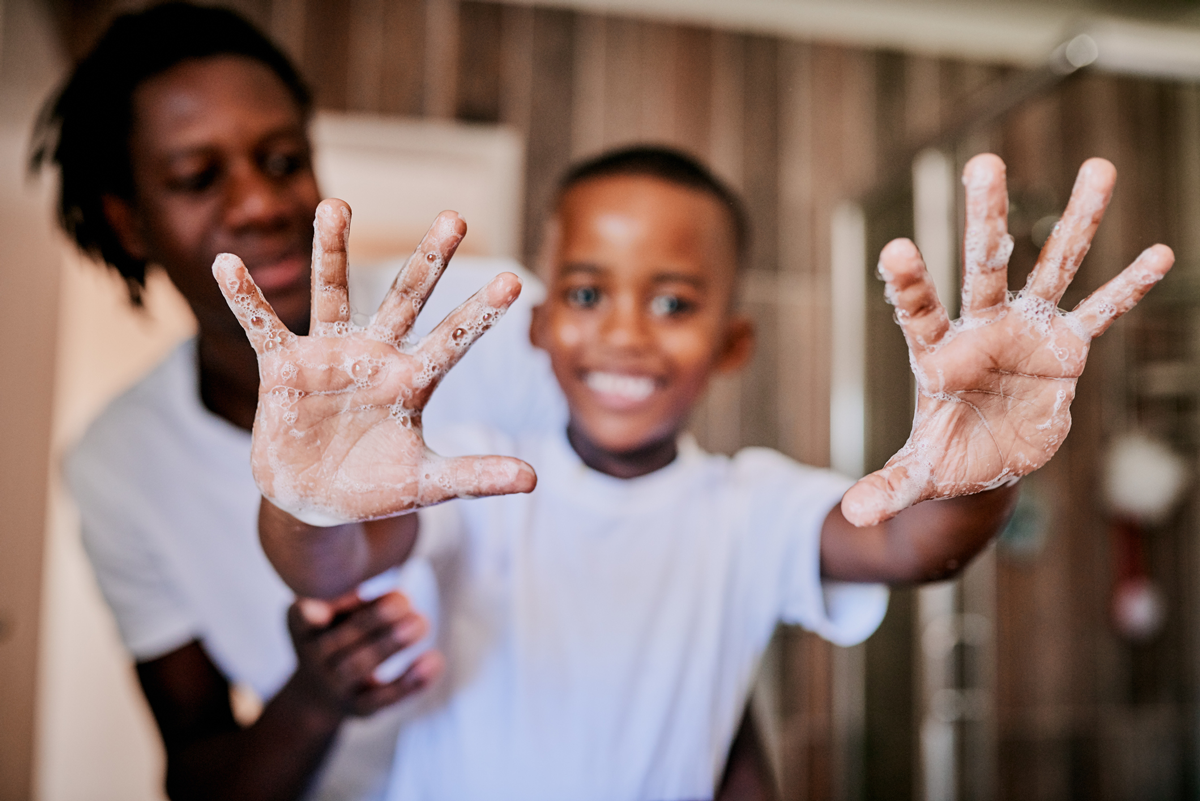I mention hand washing a lot. Usually in a somewhat incidental way — the only thing that really helps to prevent the spread of norovirus is washing your hands, or, if you have visitors around your newborn, make sure they wash their hands.
But hand washing isn’t just an afterthought. It deserves its own article. Today:
- The (brief) history of hand washing
- What we know about the impact on disease, especially in little kids
- How to get everyone (adults and children) to wash their hands
Spoiler on the last point is that it is hard to get people to wash their hands. Sorry!
History of hand washing
Historically, prior to the mid-1800s and even a bit past that, people were extremely resistant to the idea that washing hands would be related to disease. Sure, they washed their hands, but mostly related to religious rituals. For the most part, the idea that hygiene would have a benefit in medicine was not just ignored but actively shunned.

There were exceptions. Moses Maimonides — who died in 1204 — was a proponent of hand washing after dealing with sick patients or when he got off his horse. But overall, doctors for centuries seemed to take this idea as ridiculous. A substantial cause of maternal mortality was doctors who dealt with corpses and then immediately came to deliver a baby, without any hand washing. This introduced bacteria and, many times, killed the woman (this was before penicillin as well). During this period, midwives achieved a much better survival rate, simply because they focused only on deliveries.
In the mid-1800s, several people ultimately turned the tide on hand washing: Oliver Wendell Holmes; a Hungarian doctor named Ignáz Semmelweis; and Florence Nightingale, who trained her nurses to wash their hands and faces, among other reforms. And still, despite empirical proof of their claims, there were haters. Semmelweis refused to publish his findings showing that hand washing saved lives for fear of ridicule. As the germ theory of disease developed, hand washing became accepted as important in medicine. And, of course, beyond.
Hand washing and kids’ diseases
The initial evidence about the importance of hand washing was based on medical settings. It’s very clear, given our understanding of germ theory, why hand washing would prevent disease in this case. Treating disease requires close contact with sick patients — patients who carry bacteria or viruses, in many cases. Transiting between patients, it is easy to carry those germs to another patient. Hand washing kills these germs, hence it helps.
So does hand washing prevent the spread of illness in non-medical settings, like your home, or school, or day care? And if so, how much spread is prevented? The answer will depend on how good people are on average at adhering to hand washing, as well as how important this particular avenue of spread is. In day care, kids spread germs in many ways — sharing snacks, licking faces — so, unlike in a medical setting, it’s less controlled.
Nevertheless, the data shows that hand washing in child care settings can dramatically decrease the incidence of gastrointestinal viruses. In a meta-analysis, hand-washing interventions in child care settings in high-income countries decreased diarrhea incidence by 30%. Diarrhea is the primary focus of studies on this topic, although there is some evidence from other child care settings of a reduction in norovirus with enhanced hand hygiene.
It is more challenging to study household transmission and the role of hand hygiene. What seems clear — again, based on the science — is that if someone in the household has a stomach illness, hand washing should somewhat lessen the chance of it spreading to others. In the case of norovirus, for example: it is spread through inhaling or ingesting the virus from the affected person. If you clean vomit off a child, germs are on your hands, and if you wash them carefully afterward, you could (I emphasize could) save yourself.
Hand washing, in contrast, is likely to play a more limited role in the spread of respiratory illnesses, which are more likely to be spread airborne or through sneezing or coughing in the face of other people. This isn’t to say there is no role, but the impacts are certainly smaller.
Conclusion: Hand washing is known to be very important in medical settings for a number of infection-control reasons. In community settings, there appear to be large impacts on diarrhea in particular. It should also be noted that hand washing carries no risks (other than dry skin) and is inexpensive. It’s a no-brainer! A basically free intervention that makes you smell better and makes everyone around you less sick.
The only problem is: it’s very hard to get people to do it.
What about sanitizer? The short answer is that hand sanitizer is a good option if hand washing isn’t available, as it kills many germs. But there are some things (notably, norovirus) that are not killed by alcohol-based sanitizers, so if possible, hand washing is best.
Why is it so hard to get people to wash their hands?
Compliance with hand washing is not perfect — honestly, it’s not even that good. This study, which is pretty depressing, is a review of other studies on hand-washing compliance in the intensive care unit. Forget about at your child’s day care center; these are studies in medical settings. The studies generally observe, either overtly or secretly, medical provider behavior and compare their hand-washing behavior with what is suggested by the World Health Organization as the gold standard.
Focusing only on higher-income countries, only 65% of health care providers adhered to the guidelines. These numbers were higher for infant and pediatrics ICUs relative to adult facilities (which I guess is encouraging) and higher for nurses than doctors. (These numbers are far, far worse in lower-income countries, for reasons of access. That’s an important policy priority, but not what I want to focus on today.)
If this is what is happening in the ICU, is it any wonder that we do not have high compliance in child care settings, or in our own homes? If your doctor might not be washing their hands, how can you be surprised when your 9-year-old comes out of the bathroom insisting they washed their hands, which you can clearly see they did not by the dry sink and towel?
The question is: how to get more hand washing?
The answer is: we don’t know. Information campaigns might have some effect, but low compliance persists even in settings like hospitals where the value is known. This is something hand washing has in common with many other positive health behaviors, like eating vegetables and exercising. People know they should do it, but for some reason they do not. Hand washing is annoying, it takes time, it’s easier not to do it. One interesting intervention in a school in Pakistan tried to motivate children by teaching them about germs and showing them germs on their hands with a special light. This achieved a short-term increase in hand washing but nothing sustained.
Making hand washing easier and more accessible is also thought to be helpful, though, again, far from a silver bullet.
Some success has been found with so-called “nudges” — basically, reminders in the moment, in various forms. This paper summarizes several of those. They are mostly focused on bathrooms — how do you get people to wash their hands when leaving the toilet? Options include threatening messages, encouraging messages, pictures of eyes watching you (since people are more likely to wash their hands if someone else is in the room with them), signs on the floor to show you how to walk to the sink, and so on. The effects of these interventions were mostly small: a 20%, 30% increase in hand washing, and it’s hard to know what to make of some of the results (for example, pictures of men’s eyes watching make people more likely to wash hands, but not female eyes, which doesn’t make much sense). Overall, this evidence is underwhelming.
I wish this paragraph said some version of “The magic formula is…” But it does not. In writing this post, I had all kinds of creative ideas, which I’m sure you can add to. Things like telling kids that you installed a special sensor in the bathroom door that will sound an alarm if it detects germs on their hands (good idea until they try to test you). Or toilet paper with a light coating of purple dust that comes off on your hands (good idea but doesn’t work for men peeing). The problem is it’s not just bathrooms — we really want people to wash their hands regularly, and that’s simply hard.
Closing thoughts
The dubious history of hand washing and its underuse even in the modern day are probably a reflection of the same basic issue. When people wash their hands, nothing happens. I mean, things happen — reductions in germs that lead to less illness! But nothing visual happens, and the benefits for illness prevention appear later and disconnected. We do not get the dopamine hit of success or positive reinforcement that might keep us coming back.
And yet: we should continue to try. With reminders and nagging. In the words of the authors of the work on the history of hand washing that I mentioned above, “The forerunners of handwashing were met with nothing but ignorance and mockery. Let us try to improve our hand hygiene and think about them as we wash our hands.”
The bottom line
- Prior to the mid-1800s, people were extremely resistant to the idea that washing hands would be related to disease. As the germ theory of disease developed, hand washing became accepted as important in medicine (and beyond).
- Hand sanitizer is a good option if hand washing isn’t available, as it kills many germs. But there are some things (notably, norovirus) that are not killed by alcohol-based sanitizers, so if possible, hand washing is best.
- Hand washing is known to be very important in medical settings for a number of infection-control reasons. In community settings, there appear to be large impacts on diarrhea in particular.
- Even with this knowledge, it is difficult to get people to wash their hands.


















Log in
Could you add more about timing and situations where you should wash hands? Obviously we do it after using the toilet, and we try to before eating, and when getting home. I think about touching surfaces at a daycare (door knobs, etc.) and then how likely it is I’d make it home before absent mindedly touching my eyes or nose. Is it even worth it to wash hands then? When should you really do it and when is overkill and when the timing isn’t obvious like after you wipe your butt, how do you approach timing?
This is so interesting! I’m curious if any of this differs in non-western cultures. (This seems to focus on the US and Europe.) Was there an aversion to hand washing historically? When was germ theory accepted?
We went on a Disney cruise last year and the kid’s club had some really cool handwashing stations right at the door. It was basically a car wash for your hands with all sorts of fun lights and water spraying. It looked cool enough that I wished I could use it and my daughter loved it! Making handwashing fun was definitely effective in that case. I wish those types of handwashing stations were more prevalent.
I think about this a lot, especially when stomach bugs are going around my children’s classrooms, and my kids report how difficult it is to wash their hands before eating – time-wise as well as logistically. In schools and daycares, there are some design changes that I think would reduce the friction to wash hands, increasing social pressure, and make it easier to prioritize, where there is the interest. Obviously, the architectural changes are much more easily done in new construction, and costly to retrofit, but if we really care enough, I think it would make more of a difference than other avenues alone.
Our co-op preschool prioritized handwashing before snack time even before the pandemic, but it was adult-intensive, since you needed at least one adult to monitor the bathroom sinks, which are inside the bathroom, which is out of sight of the rest of the building. Because it was a co-op, where parents participate regularly to reduce cost, there were enough adults to have the teachers holding most of the classes and dismiss children slowly enough to minimize crowding, an adult to monitor the handwashing efficacy and completion in the bathroom, and other adults to start snack as children finished in the bathroom. Since increasing staff in schools just to support handwashing is highly unlikely, again, changes to the physical environment would reduce the need for additional people.
In our elementary school, there are two bathrooms in each classroom and the sinks are outside in between the bathrooms, which increases the ability to monitor handwashing as well as the social pressure to do so. That only goes so far, especially since in some classrooms, this area is out of sight of the rest of the classroom, but it’s a slight improvement, and also decreases young children wandering the halls when going to the bathroom.
In addition to that set-up, what I would love to see in all cafeterias – not just in schools – are long sink troughs in the hall leading up to cafeterias with old-fashioned foot pedals for the water to both reduce contamination of a high-touch surface as well as prevent water wasting (instead of sensors that break or are fussy where you put your hands, or push-down faucets that never quite give you enough time to get all the soap off). That way, you would have to walk by the sinks to reach the food – it is an obvious and public reminder of what you’re supposed to do. People who want to wash their hands could do so easily regardless of policy, and it would make it much easier for schools to decide it was important, and for staff to monitor. Given the amount of school my children missed because of illness from k-2 (vs very little in preschool), you would think it would be a higher priority to prevent illness, especially here in CA, where daily attendance dictates the amount of money the school gets from the state.
Buy two agar plates (to grow cultures, can get cheap on the Internet). Have your kids come home from school and put their hands on one. Then, thoroughly wash and dry hands on a clean towel and have them put hands on the other. Wait for about four days. You’ll be completely convinced!
I shared with my husband – since we bicker about this – and he quipped, “What she didn’t say is, ‘How much hand washing is needed to make it effective’… like do we get 80% of the benefits when just rinsing with water? Or only 20% and we must always use soap for any substantial effect? Is 5 seconds sufficient if there is soap? 20s?”
I am a biologist (cancer) with a hobbyist’s interest in issues of the microbiome and hygiene theory. Hand washing is actually a pretty complex. I think than the main takeaways are antibacterial products are nearly always ineffective or actively harmful and should be avoided. Alcohol based sanitizers can be really good if they are used in a situation that you are dealing with immunocompromised people and nasty germs like a healthcare worker. Healthcare, childcare and food prep workers should be very careful of their skin health because damaged skin can actually shed more bacteria (most of the bacterial that you pass on from your skin is attached to shed skin flakes, more damaged skin, more shedding). Handwashing and bathing in general has little effect on your established skin microbiome but can remove transient bacteria. So the main point: if you are handling poop or vomit, wash your hands! If you aren’t, you can probably relax and make sure you aren’t washing so much as to damage your skin because your healthy skin layers and microbiome are also doing a big job to protect you from infection.
Does anyone have advice on how to wash the hands of a 1 year old or how to wash your own hands while carrying a baby? I know handwashing is important but I feel like it’s the one thing I can’t figure out how to do one handed. I’m thinking in particular about how to do this in public places where putting baby down isn’t a good or possible option.
So interesting! Can you share a bit on the efficacy of hand sanitizer, using sanitizing hand wipes, or hand washing without soap as alternatives to hand washing? Thank you!
Alcohol based sanitizers are great because they work faster than plain soap so they are more likely to be used correctly and can be gentler on your skin than harsh scrubbing if paired with a good moisturizer. But they do not work well on norovirus. TBH, if you have norovirus in your house, you might as well go nuclear and drown everything in bleach because death is a better fate.